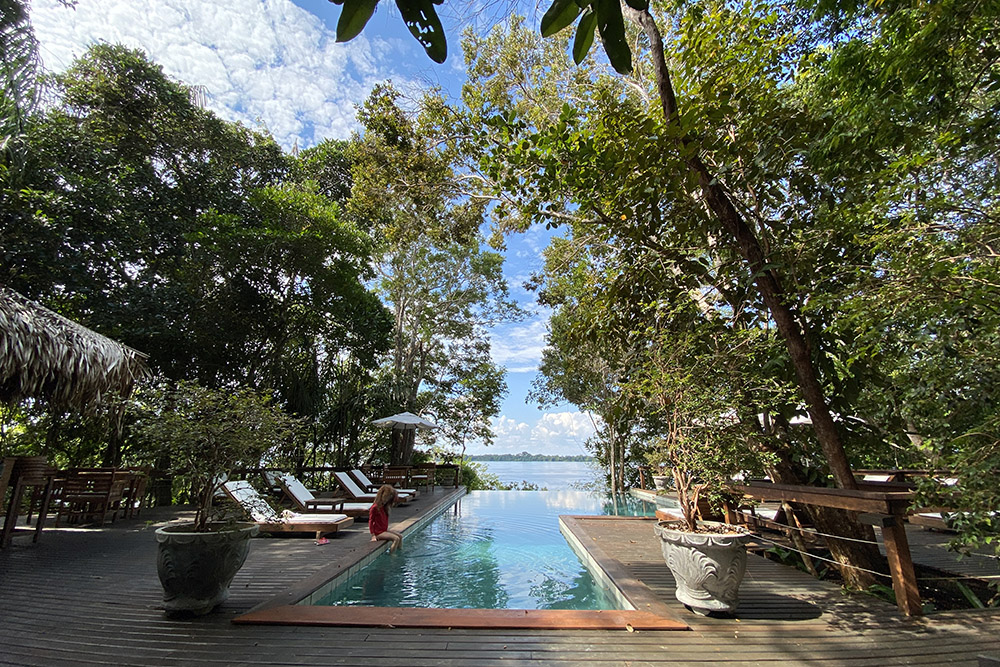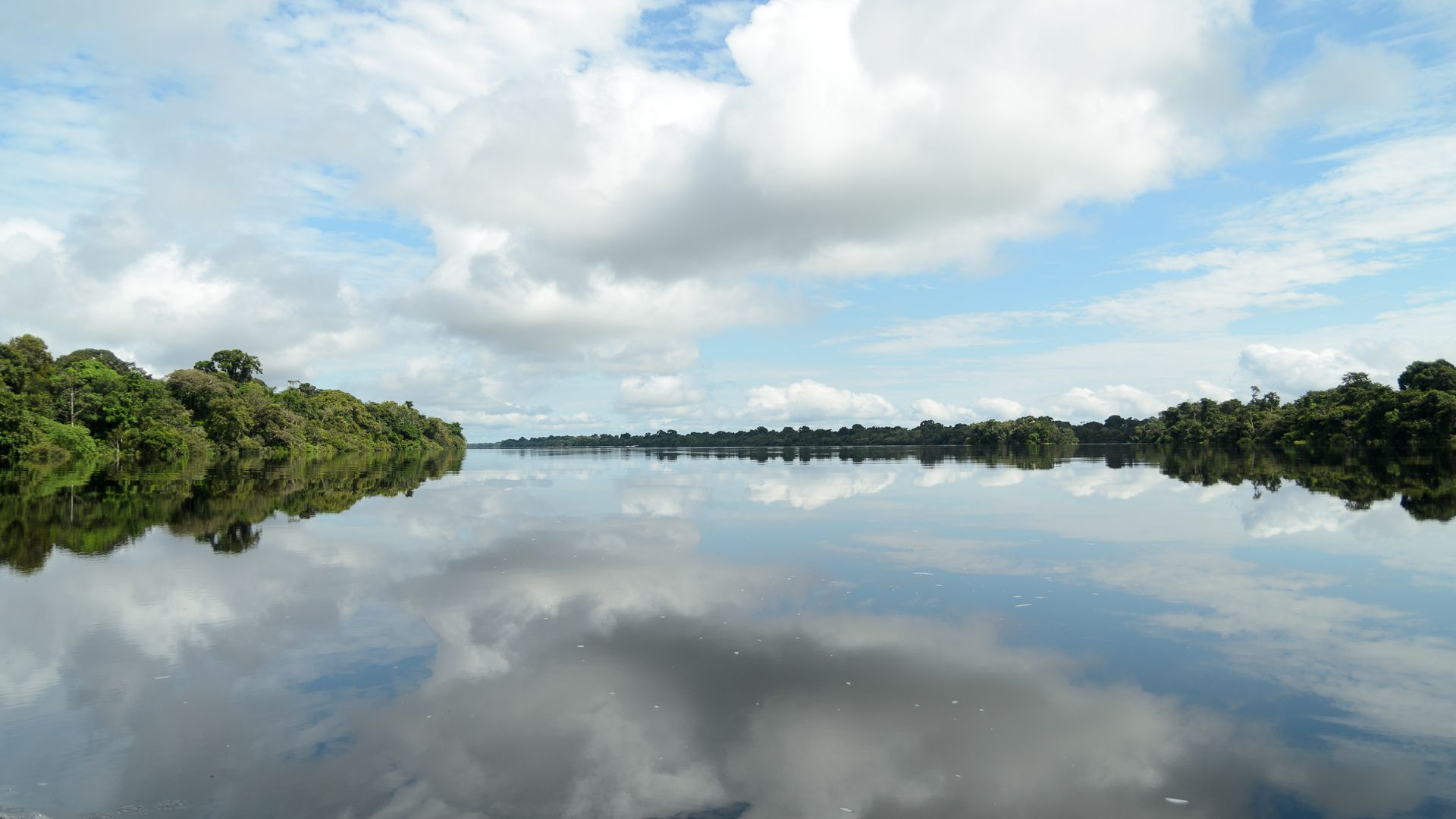(Opinion) Just the word ‘Amazon’ conjures up such extraordinary emotions in me, from an overwhelming feeling of vastness to a sense of simple communion with nature.
Ten years have passed so quickly since I last sat on the dock of the wonderful Anavilhanas Lodge with my feet in the Rio Negro, watching the slow movement of a native longboat navigate the quiet river, savoring the sounds of nature, breathing deeply, and wondering fearfully what is to become of the Amazon region.
The Lodge has been for me a treasured escape.
“I am a careful optimist” says my friend, ‘Guto’, Augusto Costa Filho who in 2005 with his wife Fabiana Caricati, pooled their savings, and managed to purchase 50 hectares on this riverbank.
They built the superb Anavilhanas Jungle Lodge, “the fulfillment of a dream to make an ecologically sustainable and socially responsible difference. It’s doing something for the Amazon, not destroying it”.

I wanted to know more from him about how things have changed.
Doing something for the Amazon and not destroying it has for Guto meant deep immersion into what he describes as “the Amazonian experience”, a growing perception of the delicate balance between economically driven politics and the overpowering influence of the environment.
Situated at the edge of Novo Airão, an almost unpopulated area the size of Switzerland with a population of only approximately fourteen thousand and just his Lodge and the nearby Mirante do Gavião Amazon Lodge providing comfortable accommodations for visitors.
“We can’t be complaisant” he explains.
Novo Airão and its surrounding area, just 195 kilometers from Manaus, have enjoyed considerable government attention and investment in the past few years.
An increasing number of “good people who have worked hard and earned their livings honestly” have begun to buy land and build modest houses in the area.
“There is only one road”, he says happily, “and it ends here”.
The couple applauds the fact that the native population is getting richer and able to enjoy some material benefits even though it means prices for things are rising.
But already, they can feel a sense of change. They applaud the fact that the native population is able to thrive in activities linked to what Guto describes as “sustainable low-impact tourism and the new opportunities it brings.”
But as a former Intel economist, he is aware and afraid of the negative impacts that will come if there is no planning and a thoughtful correct diagnosis of how to take advantage of the region’s potential.
Guto gave up the corporate world and with his wife, manages the Lodge and a hotel, ‘Villa Amazonia’ in Manaus.
He says the aim of the Lodge is to provide a small number of visitors (the lodge has just 16 elegant individual cottages and 4 bungalows and a maximum capacity of 40 guests) with a combination of air-conditioned comfort “engulfed” in nature.
Quite naturally, encouraging ‘serious’ tourism is important. “We are eager for visitors who wish to experience the magic of the amazon, especially children to whom a visit is often a life-changing experience.”
Located at the edge of the Brazilian government’s Anavilhanas National Park, it is an area containing more than 400 islands, the world’s second-largest riverine.
Experiencing the Amazon, trekking in the rain forest, paddling canoes among the treetops of flooded islands in the rainy season, fishing for piranhas and then swimming in the river with them, watching our kids swinging Tarzan-like on hanging vines and learning jungle lore from an Amerindian guide.
That and watching the timeless flow of life on this extraordinary river is truly unforgettable.
It is an immersion in nature so complete that for a time at least, everything else seems trivial. Everything, that is, except its increasingly fragile future.
How can something so big and unpopulated be in danger?
The fear of `destruction` is everywhere. In the last decade it is reliably estimated that more than 17% of the environmentally vital rainforest, rightly called “the lungs of the world”, has been lost to agricultural expansion, illegal logging, and mining activities, 20% in the last 50 years.

The existential danger put simply is, according to Brazil’s National Institute for Space Research, “were 40% of the forest to perish, the loss of water-recycling capacity would mean very little of the rest would have enough rainfall to survive.”
And if the rainforest’s recycling of carbon dioxide into oxygen, producing more than 20 percent of the world’s oxygen and dumping 8 trillion gallons of water into the ocean every day were to stop, it would be an unmitigated disaster.
The rainforest would be gone and never return.
That the river Negra has been reaching historic highs in the last few years suggests that there may be less trees to pump water into the atmosphere, a sign of the growing danger.
Brazil’s former president, Jair Bolsonaro, gave lip service to protecting the Amazon while reducing the protection to prevent the rich natural resources from being plundered and large areas of the trees, so essential to the delicate Amazonian eco system to be felled.
Said Bolsonaro inelegantly: “Brazil is the virgin that every foreign pervert wants to get their hands on.”?
Many Brazilians have asked: whose Amazon is it anyway?
What business is it of non-Brazilians to concern themselves with the fate of this ‘virgin’ and who is to finance her purity? The Amazon (or at least the 60% of it lies in territorial Brazil) is a Brazilian national asset. No argument there.
“We don’t live in an isolated world anymore,” muses Guto. “Climate change knows no national borders.
Guto turns serious when he describes “the so-called Arc of Deforestation” on the eastern, southern, and southeastern edges of the Brazilian Amazon, which has reached a point of difficult reversal.
“For many years, I looked for concrete evidence of the importance of the Amazon to the world, an objective search to support my love and desire to preserve this magical forest” he says.
“The evidence has never been clearer, but at the same time, little is being done to keep it standing.”
“Despite still being far from where we are in Novo Airão, imagining the possible advancement of the incursion has brought me sleepless and anxious nights” he says.
“A large part of this process is criminal, but an equally important part comes from the movement of poor people seeking better living conditions. How can we be against that? It is a very delicate balance.”
Certainly, Guto’s love of the Amazon is infectious and his reflections on the changes of the last ten years alarming for those like him, truly committed to preserving it.
As the river flows quietly past, it is just too easy to simply let its gentle rhythm put the fears and dangers of destruction out of mind.
We do that at our peril.

